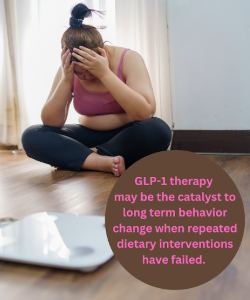Wayne, PA
Advanced Weight Loss Management with GLP-1
When everything else has failed, nutrition therapy coupled with medical interventions such as GLP-1 agonist treatment may be the right path for you.
Introduction to GLP-1
GLP-1 (glucagon-like peptide-1) is a hormone that plays a role in glucose homeostasis, and medications targeting GLP-1 such as Ozempic, Zepbound and Wegovy may be used in the treatment of type 2 diabetes, however, these medications may also be indicated for weight loss as prescribed by a doctor. Although severe malnutrition risks associated directly with GLP-1 are not typically reported, there is the risk of loss of lean body mass and gastrointestinal discomfort causing low adherence. It's important to consider how the use of GLP-1 agonists or related medications may impact dietary habits and nutritional status to improve adherence, outcomes, preservation of lean body mass and treatment of digestive discomfort.
Here are some considerations:
Appetite and Weight Loss:
Some GLP-1 medications can affect appetite and may lead to weight loss. While this can be beneficial for individuals with obesity or type 2 diabetes, excessive weight loss may pose a risk of malnutrition and generalized muscle weakness if not carefully monitored.
Gastrointestinal Effects:
GLP-1 agonists may cause gastrointestinal side effects such as nausea, vomiting, or diarrhea in some individuals. These symptoms can affect food intake and nutrient absorption, potentially leading to nutritional deficiencies.

Dietary Changes:
Individuals prescribed GLP-1 agonists may experience changes in dietary habits due to alterations in appetite or preferences. It's important to maintain a balanced and nutritious diet despite any changes in eating patterns.
Nutrient Absorption:
Gastrointestinal effects of GLP-1 agonists may impact nutrient absorption. Monitoring nutrient levels, especially fat-soluble vitamins and minerals, may be recommended to prevent deficiencies.
Dehydration:
Decreases in appetite and feelings of fullness can reduce fluid intake which may lead to dehydration and can cause serious health problems such as fainting, cramping, electrolyte imbalance, urinary/kidney injury, low blood volume shock or seizures.
Consultation with Healthcare Professionals:
People taking GLP-1 medications should work closely with their healthcare team, including a registered dietitian. Regular monitoring of nutritional status and adjustments to the diet or medication plan may be necessary.
Individual Variation:
Responses to GLP-1 medications can vary among individuals. Some may experience significant weight loss and changes in appetite, while others may not. Personalized monitoring and adjustments are highly recommended.
Get My Consult
Do you need a dietitian for GLP-1?
Yes. It's crucial for individuals using GLP-1 medications to communicate openly with their healthcare providers about any changes in appetite, weight, or dietary habits. Regular check-ups and assessments of nutritional status can help identify and address potential malnutrition risks. Many insurance companies require an interdisciplinary approach that includes lifestyle and dietary interventions. Furthermore, a dietitian may help you develop life long, sustainable changes to remain in place after drug intervention has been completed.
Manage Risk with a Health Care Professional
Always follow the guidance of healthcare professionals when it comes to managing medications and maintaining a healthy diet. Main Line Nutrition and Fitness has teamed up with local medical doctors and has created one of the newest programs on the Main Line that incorporates medical treatment with personalized nutrition therapy and fitness to decrease the risk of malnutrition, bone density loss and loss of lean body mass (muscle) associated with GLP-1 agonists. Achieving a healthy weight status is a wonderful goal, however, being strong enough to avoid the risk of falls, and fractures and simply being able to enjoy an active lifestyle is equally if not more important.
Cost of Weight Management with GLP-1
The costs involved in the administration of GLP-1 agonists are insurance dependent, however, preventative nutrition therapy for cardiovascular disease in the setting of diabetes and elevated BMI are typically $0 out of pocket. As an added bonus, an expert certified personal trainer will provide you with a regimen to build/maintain lean body mass. Our program includes close interaction between doctors, dietitians and fitness experts to provide the best service possible. Contact us if you are interested as spaces are limited!
Tired of gaining weight or fad diets? Our Wayne, PA dietitians offer personalized step-by-step assistance to meet your weight loss goals. To learn more, contact us today.
Contact Us
Disclaimer: GLP-1 medication requires a prescription by a physician. Please discuss drug indications and/or side effects with the physician. Main Line Nutrition and Fitness does prescribe or advise on the use of GLP-1 or any other medications.